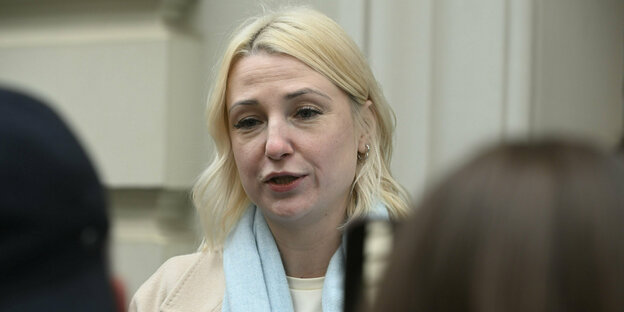Yekaterina Duntsova wanted to run against President Putin and she wasn't even registered. She has now founded a party.

December 27: Yekaterina Duntsova speaks to the press after the electoral commission rejects her candidacy. Photo: Dmitry Serebryakov/ap/dpa
MOSCOW taz | “Because?” Why would she do this to herself when it was already clear to everyone who would be the next president of Russia? It's the first question Yekaterina Duntsova has been asked since she announced her candidacy for Russia's new president in November. Since she, the complete stranger, emerged to conquer the public with a charm that apparently she has not yet found herself.
His answer: something has to change in Russia. She wants to spread “positive messages,” as she puts it. She represents “Peace, Love, Friendship”. She is convinced that the system needs a real alternative. A system that does a lot to ensure that this alternative is not allowed to be in the first place.
Dunzowa founded his own party over the weekend. It should be called “Dawn” and its objective: “Bring to power people who live in the future, not in the past, in a safe country in which the well-being of all and not the enrichment of the elected is the most important thing.” the priority.” in the document. The night after the meeting, the police took her away: drug check. “I hope this was just a misunderstanding,” she wrote after her release.
She knows the bugs in the system: as soon as she talked about her plans for the elections, the prosecutor invited her to “discussions” and apparently wanted to hear her opinion about “the activities of the Russian army in Ukraine.”
Each of his interviews makes his caution clear.
At the first meeting with Duntsova's supporters in Moscow, the lights in the hall went out. A smear campaign began. The 40-year-old was said on some Telegram channels to be a puppet of former oil tycoon Mikhail Khodorkovsky. The Central Election Commission did not even register her as its candidate, due to alleged “serious errors” in the documents. It is common practice to exclude opposition members from elections. “This is how it works in our country,” Duntsova said, dismissing attempts at intimidation as “normality.”
She knows what political field she is active in. Each of her interviews, which she grants mainly to independent national and foreign journalists, makes her caution clear. Dunzowa appears nervous, wanders around, avoids topics with a sheepish smile and certainly doesn't say the word “war.” She speaks – as required by law – of “special military operations” and, according to herself, advocates for a “peace agenda.”
This 40-year-old woman is a lawyer and, like everyone in Russia today, knows where her path would lead her if she criticized too clearly and loudly the existing regime she is willing to oppose. The laws facilitate prosecution for the so-called discrediting of the Russian army. They are afraid, of course, who isn't in Russia? She did not lose her courage after the regime's attempts to discourage her. They seem to be dragging her further into politics.
He wants to score points with the women's issue. “Women stand for gentleness, kindness and tranquility.” In doing so, he also defends the country's patriarchal views. People are tired of what is happening. The “conflict” in Ukraine must be resolved through negotiations. He does not say what he would negotiate, how or where. “Everything is sad. “Someone has to take responsibility and leave.”
Against fear and against probability
Yekaterina Duntsova gets going. She founded an initiative group and wanted to collect signatures for her candidacy, but the authorities prevented her from doing so. Now she wants to make a difference with her party “Dawn”, she advocates for the release of political prisoners and wants to campaign for the rights of sexual minorities. She considers herself a “bringer of hope” and from the beginning she was aware that “this figure” surpassed everything she had done before.
Duntsova was born in Siberia in 1983 and moved as a teenager to Rzhev, a small town almost 200 kilometers northwest of Moscow. After studying law and training as a television journalist, she was a member of the Rzhev city parliament. The mother of two daughters (now 19 and 16 years old) and a son (10), she was upset because direct mayoral elections had been abolished, so she dedicated herself to politics. She was an active activist for missing children and adults in her city and she was always engaged with the general public, she says in interviews. Now she wants to move on.
“You can do it, Katya!” her family and friends in Rzhev told her. And “Katja” – short for Yekaterina – she tries. Against the regime. Against her own fear. Against all odds.